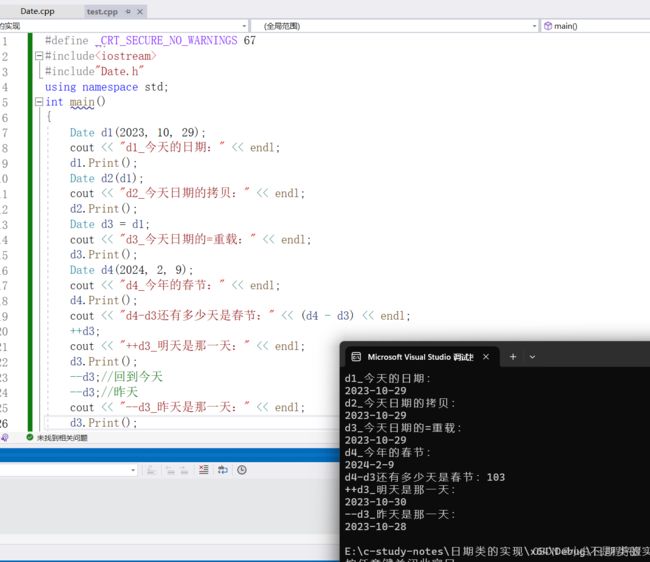【C++初阶】类和对象——操作符重载&&const成员函数&&取地址重载&&日期类的实现
=========================================================================
个人主页点击直达:小白不是程序媛
C++系列专栏:C++头疼记
=========================================================================
目录
前言:
运算符重载
运算符重载
赋值运算符重载
前置++和后置++重载
const成员
取地址及const取地址操作符重载
使用函数操作符重载完成日期类的实现
前言:
上篇文章介绍了在C++的类六个成员函数中的三个,分别是构造函数、析构函数、拷贝构造函数,不知道大家有没有所收获,今天我们带来的是剩下的三个函数,以及结合这六个函数完成一个完整的日期类的实现,让我们开始今天的征程吧!
运算符重载
在C++中有很多的运算符,包括 +、- 、* 、/、等等,一个两两结合的操作符++、--、+=,>=、==等等。
int main()
{
int i = 0;
cout << ++i << endl;
cout << --i << endl;
i = 2;
cout << i << endl;
return 0;
}对于内置类型来说我们可以直接使用,但是对于我们自己定义的自定义类型呢?该如何使用呢?
-
运算符重载
C++为了增强代码的可读性引入了运算符重载,运算符重载是具有特殊函数名的函数,也具有其
返回值类型,函数名字以及参数列表,其返回值类型与参数列表与普通的函数类似。
函数名字为:关键字operator后面接需要重载的运算符符号。
函数原型:返回值类型 operator操作符(参数列表)
注意:
- 不能通过连接其他符号来创建新的操作符:比如operator@
- 重载操作符必须有一个类类型参数
- 用于内置类型的运算符,其含义不能改变,例如:内置的整型+,不 能改变其含义
- 作为类成员函数重载时,其形参看起来比操作数数目少1,因为成员函数的第一个参数为隐藏的this
- .* :: sizeof ?: . 注意以上5个运算符不能重载。这个经常在笔试选择题中出现。
示例:==运算符重载
class Date
{
public:
Date(int year = 1, int month = 1,int day=1)
{
_year = year;
_month = month;
_day = day;
}
bool operator==(const Date& y)
{
return _year == y._year && _month == y._month && _day == y._day;
}
private :
int _year;
int _month;
int _day;
};-
赋值运算符重载
赋值运算符重载格式
参数类型:const T&,传递引用可以提高传参效率
返回值类型:T&,返回引用可以提高返回的效率,有返回值目的是为了支持连续赋值检测是否自己给自己赋值
返回*this :要复合连续赋值的含义
class Date
{
public:
Date(int year = 1, int month = 1,int day=1)
{
_year = year;
_month = month;
_day = day;
}
Date& operator=(const Date& d)
{
this->_year = d._year;
this->_month = d._month;
this->_day = d._day;
return *this;
}
private :
int _year;
int _month;
int _day;
};赋值运算符只能重载成类的成员函数不能重载成全局函数
class Date
{
public:
Date(int year = 1900, int month = 1, int day = 1)
{
_year = year;
_month = month;
_day = day;
}
int _year;
int _month;
int _day;
};
// 赋值运算符重载成全局函数,注意重载成全局函数时没有this指针了,需要给两个参数
Date& operator=(Date& left, const Date& right)
{
if (&left != &right)
{
left._year = right._year;
left._month = right._month;
left._day = right._day;
}
return left;
}原因:赋值运算符如果不显式实现,编译器会生成一个默认的。此时用户再在类外自己实现
一个全局的赋值运算符重载,就和编译器在类中生成的默认赋值运算符重载冲突了,故赋值
运算符重载只能是类的成员函数。用户没有显式实现时,编译器会生成一个默认赋值运算符重载,以值的方式逐字节拷贝。
注意:内置类型成员变量是直接赋值的,而自定义类型成员变量需要调用对应类的赋值运算符
重载完成赋值。
class Date
{
public:
void Print()
{
cout << _year << "-" << _month << "-" << _day << endl;
}
Date(int year = 1, int month = 1,int day=1)
{
_year = year;
_month = month;
_day = day;
}
private :
int _year;
int _month;
int _day;
};
int main()
{
Date d1;
d1.Print();
Date d2 = d1;
d2.Print();
return 0;
}这里我们没有写赋值重载函数,编译器会自动生成一个完成操作,和拷贝构造函数优点类似。
注意:如果类中未涉及到资源管理,赋值运算符是否实现都可以;一旦涉及到资源管理则必
须要实现。
-
前置++和后置++重载
class Date
{
public:
void Print()
{
cout << _year << "-" << _month << "-" << _day << endl;
}
Date(int year = 1, int month = 1,int day=1)
{
_year = year;
_month = month;
_day = day;
}
// 前置++:返回+1之后的结果
// 注意:this指向的对象函数结束后不会销毁,故以引用方式返回提高效率
Date& operator++()
{
*this += 1;
return *this;
}
// 后置++:
// 前置++和后置++都是一元运算符,为了让前置++与后置++形成能正确重载
// C++规定:后置++重载时多增加一个int类型的参数,但调用函数时该参数不用传递,编译器自动传递
// 注意:后置++是先使用后+1,因此需要返回+1之前的旧值,故需在实现时需要先将this保存一份,然后给this + 1
// 而temp是临时对象,因此只能以值的方式返回,不能返回引用
Date operator++(int)
{
Date tmp(*this);
*this += 1;
return tmp;
}
private :
int _year;
int _month;
int _day;
};
int main()
{
Date d1;
d1++;// 1-1-2
++d1;// 1-1-1
return 0;
}const成员
将const修饰的“成员函数”称之为const成员函数,const修饰类成员函数,实际修饰该成员函数
隐含的this指针,表明在该成员函数中不能对类的任何成员进行修改。
我们来看看下面这段代码
class Date
{
public:
//void Print( Date *this)
void Print()
{
cout << _year << "-" << _month << "-" << _day << endl;
}
private:
int _year = 1;
int _month = 1;
int _day = 1;
};
int main()
{
const Date d1;
//d1.Print(&d1)
//权限放大
d1.Print();
return 0;
}这段代码在编译器上是编译不通过的,说明语法有问题。
因为我们创建了一个const Date *的d1,将d1作为参数传给函数时,函数的的参数是一个Date *,两个参数不匹配,权限会放大,所以编译不通过。
其实函数的形参就是this指针,那我们如何将this指针修饰为const呢?
只需要在函数声明后面加上const 即可将this指针修饰为const。
class Date
{
public:
//void Print( Date *this)
void Print()
{
cout << _year << "-" << _month << "-" << _day << endl;
}
private:
int _year = 1;
int _month = 1;
int _day = 1;
};
int main()
{
const Date d1;
//d1.Print(&d1)
//权限放大
d1.Print();
Date d2;
d2.Print();
return 0;
}
上面为修饰后的代码,我们在创建一个普通的Date *,能否在const修饰的this指针函数中跑起来呢?
答案是可以的,因为权限可以平移、缩小,不能放大。
那么请思考以下问题:
const对象可以调用非const成员函数吗?
不可以,权限放大。
非const对象可以调用const成员函数吗?可以,权限缩小。
const成员函数内可以调用其它的非const成员函数吗?不可以,权限放大。
非const成员函数内可以调用其它的const成员函数吗?可以,权限缩小。
取地址及const取地址操作符重载
这两个默认成员函数一般不用重新定义 ,编译器默认会生成。
class Date
{
public:
Date* operator&()
{
return this;
}
const Date* operator&()const
{
return this;
}
private:
int _year; // 年
int _month; // 月
int _day; // 日
};这两个运算符一般不需要重载,使用编译器生成的默认取地址的重载即可,只有特殊情况,才需
要重载,比如想让别人获取到指定的内容!
这个函数基本没有什么作用,很少用到作为了解即可!
使用函数操作符重载完成日期类的实现
void Date::Print()
{
cout << _year << "-" << _month << "-" << _day << endl;
}
//获取天数
int Date::GetMonthDay(int year, int month)
{
int monthArr[13] = { 0,31,28,31,30,31,30,31,31,30,31,30,31 };
if (month == 2 && ((year % 4 == 0 && year % 100 != 0) || (year % 400 == 0)))
{
return 29;
}
return monthArr[month];
}
//构造函数
Date::Date(int year=1, int month=1, int day=1)
{
_year = year;
_month = month;
_day = day;
}
//拷贝构造函数
Date::Date(const Date& d)
{
this->_year = d._year;
this->_month = d._month;
this->_day = d._day;
}
//赋值运算符重载
Date& Date::operator=(const Date& d)
{
this->_year = d._year;
this->_month = d._month;
this->_day = d._day;
return *this;
}
//日期+=天数
Date& Date::operator+=(int day)
{
_day += day;
while (_day > GetMonthDay(_year, _month))
{
_day -= GetMonthDay(_year, _month);
++_month;
if (_month == 13)
{
_year++;
_month = 1;
}
}
return *this;
}
//日期+天数
Date Date::operator+(int day)
{
Date tmp(*this);
tmp += day;
return *this;
}
//日期-=天数
Date& Date::operator-=(int day)
{
_day -= day;
while (_day <= 0)
{
//月小于0时应该先借位
--_month;
if (_month == 0)
{
_year--;
_month = 12;
}
_day += GetMonthDay(_year, _month);
}
return *this;
}
//日期-天数
Date Date::operator-(int day)
{
Date tmp(*this);
tmp -= day;
return *this;
}
//前置++
Date& Date::operator++()
{
*this += 1;
return *this;
}
//后置++
Date Date::operator++(int)
{
Date tmp(*this);
*this += 1;
return tmp;
}
//前置--
Date& Date::operator--()
{
*this -= 1;
return *this;
}
//后置--
Date Date::operator--(int)
{
Date tmp(*this);
*this -= 1;
return tmp;
}
//>运算符重载
bool Date::operator>(const Date& y)
{
if (_year > y._year)
{
return true;
}
else if (_year == y._year && _month > y._month)
{
return true;
}
else if (_year == y._year && _month == y._month && _day > y._day)
{
return true;
}
return false;
}
//==运算符重载
bool Date::operator==(const Date& y)
{
return _year == y._year && _month == y._month && _day == y._day;
}
//>=运算符重载
bool Date::operator>=(const Date& y)
{
return *this > y || *this == y;
}
//<运算符重载
bool Date::operator<(const Date& y)
{
return !(*this >= y);
}
//!=运算符重载
bool Date::operator!=(const Date& y)
{
return !(*this == y);
}
//日期-日期 返回天数
int Date::operator-(const Date& y)
{
Date max = *this;
Date min = y;
if (*this < y)
{
max = y;
min = *this;
}
int n = 0;
while (min != max)
{
min++;
n++;
}
return n;
}这里我们使用操作符重载,完成了一个简单的日期计算器,当然这其中还有很多没有完善的地方。像我们构造一些非法的数据作为日期等等一些小问题,我就留给大家了。
C++类和对象(中)的六个成员函数就讲完了,大家可以结合上篇文章细细阅读,慢慢探索C++这六个成员函数的奥秘 ,总结收获出一些自己的东西。也希望大家留言指出我文章中出现的内容,同时也感谢各位看官的三连支持,你们的支持就是我更新的动力!!!
下篇预告:类和对象(下)




